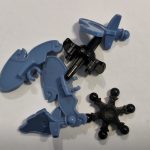

I recall that as a child I was always fascinated by Kinder Surprise products. The excitement of having milk chocolate and building my own toy! I would put the parts together, and then pull them apart to study the design behind it. Functioning toys despite the limited space and parts! The creative and engineering design behind these creations is amazing. Even as an adult, I am still curious about what companies and people go through to present a performance, a product or a service.
I come to learn that many Respiratory Therapists have a similar interest in understanding processes. Perhaps that’s what makes us skilled troubleshooters, innovators, and effective team players in interprofessional settings.
One way to nurture this strength is to ask questions. As children we were more curious and comfortable asking questions. We need to revive that sense of curiosity to promote growth.
Here are my 5 personal views and advice on asking questions.
Create a supportive space for learning
I remember on my first day of clinical rotations at my base-site hospital, our Practice Lead said: “You know the saying that there is no such a thing as a stupid question?… Well, that’s wrong”. I looked around the room and saw that the same expression of shock and surprise on the face of my fellow classmates. I hope you have a supportive culture at work or school which encourages a safe space for growth and learning. Allow your students and new hires to ask their “stupid” questions before they resort to “trial and error” on real patients.
Asking questions is a not a vulnerability but an indication of caring.
Whether you are a student or experienced RT, put egos and feelings aside and ask questions. Asking questions is not a sign of weakness but demonstrates a willingness to learn. There is danger in the mentality of “fake it until you make it”. Confidence comes with competency. We should ask questions to learn and to better master the knowledge or skillset. Learn, incorporate new learning in practice, evaluate with feedback, modify and repeat.
Questioning a routine practice is a growth opportunity and not a threat.
When questioned about a routine practice and the answer you come up with is “that’s the way we have always done it”, know that you either need to review the support for that guideline/process or you need to re-evaluate how it is done.
I have had staff RTs express that they used to follow the advice of experienced RTs and that “younger” RTs need to question everything before they do something. Please don’t view this as a criticism, threat or laziness. This is a learning framework for younger generations who have a lot more available resources and opportunities to be involved in decision making.
Timing of questions
Asking questions, just like any other form of communication, can be impacted by the timing, tone, intent, importance, and perception. If you are watching your preceptor in the middle of a complicated code and you notice a unique LMA insertion technique, the question about the technique probably can wait until the patient is more stable and/or during the debrief. If you are asked to put a BIPAP on an unconscious patient and you have valid reasons to be worried about airway protection, then your questions require more urgency.
As always, be kind to others and ask questions to learn something and not to show off your own knowledge or to make a statement.
Explore
Talk to people outside of your team, unit, hospital, and even profession. You will be surprised about the different perspectives on a subject matter. This is one of the reasons why I enjoy attending conferences that are intended for RTs and those that for various Healthcare professional audiences.
“Science is fun. Science is curiosity. We all have a natural curiosity. Science is a process of investigating. It’s posing questions and coming up with a method. It’s delving in.”
-Sally Ride (American astronaut, physicist, and engineer).
These are my personal opinions and views. Now let me ask you! What are your thoughts? How have you created a safe learning environment for your students, new hires and experienced staff? What advice do you have to share with others about asking questions? Do you have a story to share about how an inquiry helped with patient care? Leave a comment and let me know!